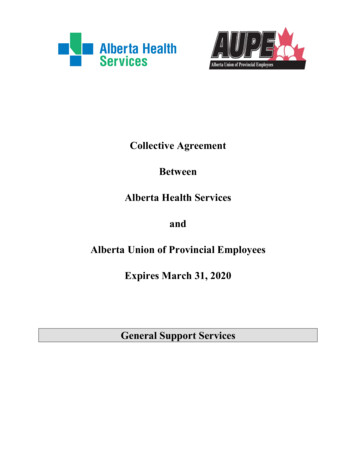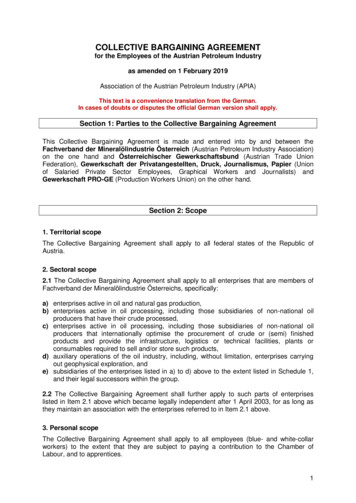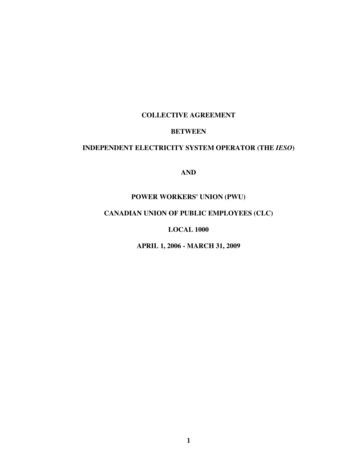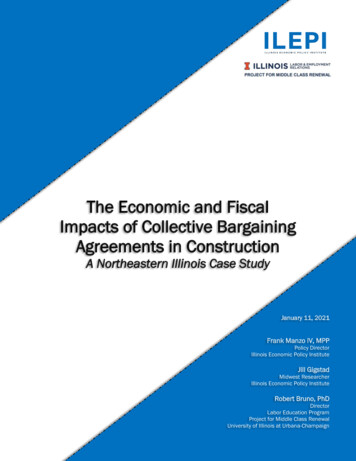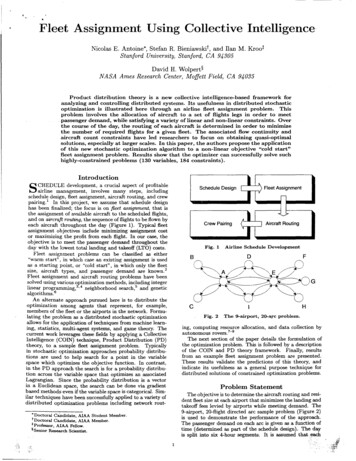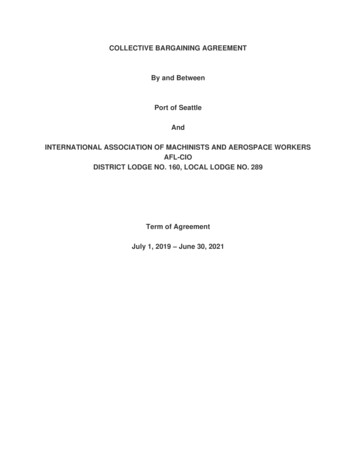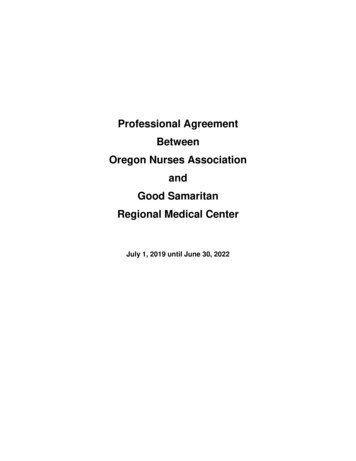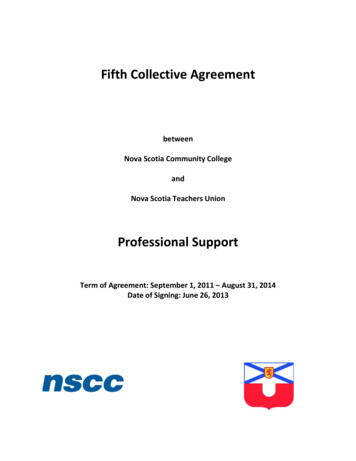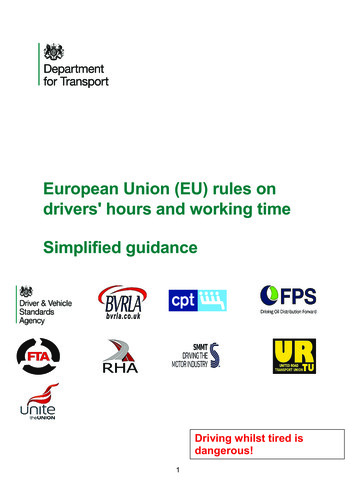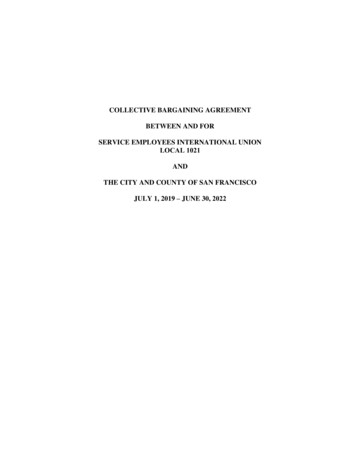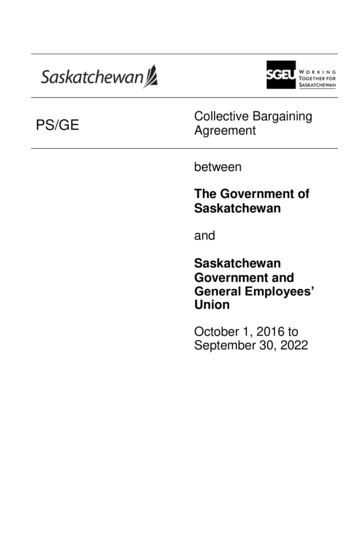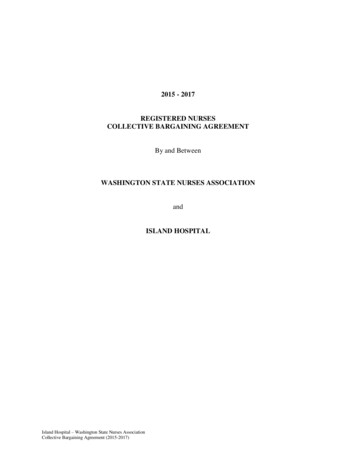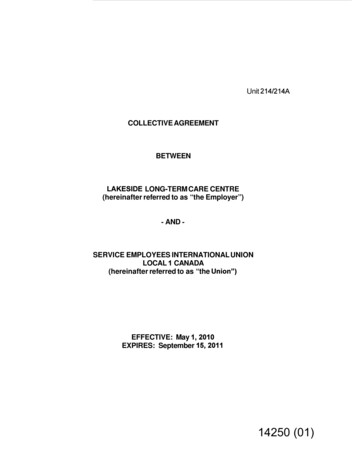
Transcription
Unit 214/214ACOLLECTIVE AGREEMENTBETWEENLAKESIDE LONG-TERM CARE CENTRE(hereinafter referred to as “the Employer”)- AND SERVICE EMPLOYEES INTERNATIONAL UNIONLOCAL 1 CANADA(hereinafter referred to as “the Union”)EFFECTIVE: May ly2010EXPIRES: September 15,201I14250 (01)
INDEXPAGEARTICLE 1PURPOSE .1ARTICLE 2SCOPE & RECOGNITION .1ARTICLE 3MANAGEMENT RIGHTS .1ARTICLE 4DEFINITIONS .2ARTICLE 5UNION SECURITY .3ARTICLE 6NO STRIKES OR LOCK-OUTS.5ARTICLE 7UNION REPRESENTATION AND COMMIlTEES .7.04 Labour-Management Committee .7.05 CMVRAI MDS 2.0 Language.7.06 Return to Work .7.05 CMI/RAI MDS 2.0 Language5677ARTICLE 8GRIEVANCE AND ARBITRATION PROCEDURE .8.01 Complaints and Grievances .8.05 Discharge Grievance.8.06 Employer’s Grievances .8.07 Union Policy Grievance .8.08 Group Grievance.8.09 Grievance Mediation Process .8.10 Arbitration Process.8.1 1 Sole Arbitrator .889101010101113ARTICLE 9SENIORITY .9.01 Effect of Absence .9.02 Probationary Period .9.05 Seniority Lists.9.06 Loss of Seniority .9.08 Nursing Home Transfers .131314141516ARTICLE 10JOB SECURITY.10.01 Lay-off and Recall .10.02 Lay-off Procedure.10.03 Recall Rights .10.04 Benefits on Lay-off .1616171819ARTICLE 11JOB POSTING.11.09 Temporary Vacancies .11.11 Permanent Transfers .192122ARTICLE 12NO CONTRACTING OUT .22ARTICLE 13WORK OF THE BARGAINING UNIT .23
13.03 Full-time/Part-time Ratio .23ARTICLE 14PRINTING.23ARTICLE 15LEAVE OF ABSENCE .15.01 Personal Leaves .15.02 Pregnancy and Parental Leave.15.03 Pregnancy Leave .15.11 Parental Leave .15.12 Union Leave .15.13 Bereavement Leave .15.14 Jury and Witness Duty .15.15 Educational Leave .15.17 Family Medical Leave (as per ESA) .15.18 Public Office Election .2323242426282929303031ARTICLE 16HOURS OF WORK .16.02 Work Schedule .16.03 Lunch or Meal Periods .16.04 Relief Periods.31323333ARTICLE 17PREMIUM PAYMENTS .17.01 Overtime .17.02 Shift PremiumsNVeekend Premium .17.03 Minimum Reporting Pay .17.05 Call Back .17.06 Call In .17.07 Responsibility. . Allowance for Work Outsidethe Bargaining Unit.333334353535ARTICLE 18ALLOWANCES .18.01 Uniform Allowance .3737ARTICLE 19HEALTH AND SAFETY .19.07 Violence .19.10 Injured Workers Provisions .19.11 Infectious Diseases .19.12 Day of Mourning.19.16 No Harassment .373940404141ARTICLE 20PAID HOLIDAYS .42ARTICLE 21VACATIONS .43ARTICLE 22HEALTH AND INSURANCE BENEFITS .22.01 Benefits Preamble.22.02 0.H.I.P .22.03 Life Insurance .22.04 Major Medical.22.05 Vision Care .47474747474836
22.0622.0722.0822.0922.10Dental.Hearing Aid .Benefit Enrollment Rules .Change of Carriers.Benefit Grievance Resolution.484848494922.11 The Nursing Homes and Related IndustriesPension Plan.22.13 Permanent Part-Time Employee ProrationFormula Benefits .22.14 New Hires.5455ARTICLE 23INJURY AND DISABILITY .56ARTICLE 24SICK LEAVE . 5724.01 Sick Leave Provision. 5724.02 Full-time/Part-time Sick Leave Transfers . 6024.05 Annual Medical and Sick Leave Certificate. 6024.06 E.I. Premium Reduction . 6024.07 Workplace Safety and Insurance Board Challenge .61ARTICLE 25COMPENSAT10N. 6125.02 Retroactivity . 6125.03 Temporary Transfers . 6125.04 New Classification. 6125.05 Wage Progression . 6225.06 Recognition of Previous Experience - RPN’s Only .62ARTICLE 26BULLETIN BOARDS .63ARTICLE 27PAY DAYS.27.03 Errors on Paycheques.6364ARTICLE 28INTERPRETATION .64ARTICLE 29PERSONAL FILES .29.01 Letters of Reprimand .29.02 Suspension .29.03 Viewing the File.64646565ARTICLE 30PAID EDUCATION FUND .65ARTICLE 31TERM .65Schedule “ AWage Schedule .Central Letters of Understanding.676951
-ARTICLE 1 PURPOSE1.01The purpose of this Agreement is to establish an orderly collective bargainingrelationship between the Employer and the employees concerned and to providemechanisms for the prompt and equitable disposition of grievances, and toestablish and maintain satisfactory working conditions, hours of work and wagesfor all employees within the bargaining unit.ARTICLE 2 - SCOPE AND RECOGNITION2.01The Employer recognizes the Union as the sole collective bargaining agent for allits employees of Lakeside Long-Term Care Centre employed at Lakeside LongTerm Care Centre in the City of Toronto, save and except supervisors, foreman,registered nurses, registered graduate nurses, activity director, maintenancestaff, office and clerical, physiotherapists and occupational therapists.2.02The Employer undertakes that he will not enter into any other agreement orcontract with those employees for whom the Union has bargaining rights eitherindividually or collectively which will conflict with any of the provisions of thisAgreement .2.03Where the feminine pronoun is used in this Agreement, it shall mean and includethe masculine pronoun where the context so applies.2.04Where the singular is used, it may also be deemed to mean the plural, within theappropriate context.2.05Any reference to doctor will include, where appropriate, nurse practitioner.-ARTICLE 3 MANAGEMENT RIGHTS3.01The Union acknowledges that all management rights and prerogatives are vestedexclusively with the Employer and, without limiting the generality of the foregoing,it is the exclusive function of the Employer:(a)to determine and establish standards and procedures for the care, welfare,safety, and comfort of the residents in the nursing home;(b)to maintain order, discipline, and efficiency, and in connection therewith toestablish and enforce reasonable rules and regulations. Such rules will bemade available to all employees and to the Local Union. The Employeragrees prior to the introduction of any new policy or procedure related to-1-
terms and conditions of employment the Union will be advised byproviding a copy of such policy to a Union Steward or through the LabourManagement Committee. The Employer agrees to consider anyrepresentation made by the Union on a province-wide basis concerningany change in rules or introduction of new rules;to hire, transfer, lay-off, recall, promote, demote, classify, assign duties,discharge, suspend or otherwise discipline employees who havecompleted their probationary period for just cause, provided that a claim ofdiscriminatory transfer, promotion, demotion of classification or a claim thatan employee who has completed his probationary period, has beendischarged or disciplined without just cause, may be the subject of agrievance and dealt with as hereinafter provided. The discharge of aprobationary employee shall be at the sole discretion of the Employer andmust be supported on a rational basis;to have the right to plan, direct and control the work of the employees andthe operations of the Nursing Home. This includes the right to introducenew and improved methods, facilities, equipment, and to control theamount of supervision necessary, combining or splitting up ofdepartments, work schedules, and the increase or reduction of personnelin any particular area or on the whole.ARTICLE 4 - DEFINITIONSFull-time employees are hereby defined to be those persons regularlyemployed on the average between 66 and 75 hours bi-weekly.Permanent part-time employees are hereby defined to be those personsregularly employed on the average more than forty-five (45) hours biweekly but less than sixty-six (66) hours bi-weekly who have completedthe probationary period described in Article 9.02. Article 22.12 describeshow this Agreement shall affect those persons.A part-time employee, who it is understood is covered by this CollectiveAgreement, is one who is committed to and works a regular schedule ofhours such that the total of bi-weekly scheduled hours is forty-five (45)hours of less.It is understood and agreed that an employee who works more than fortyfive (45) hours in a bi-weekly period, for up to twenty (20) consecutiveweeks, shall retain her part-time status under this agreement according tothe following conditions:-2-
(i)The employee is replacing a temporarily absent employee (who maybe either a full-time or part-time employee).(ii)The employee will, under normal circumstances, return to her formerposition at the end of the replacement period.The part-time employee will also commit herself to work additional daysupon request by the Employer, for example, during the vacation period,during the Christmas and New Year’s periods, to replace an employeewho fails to report for her scheduled shift, and at least an alternate paidholiday if required at any of these times. It is understood that theEmployer will recognize the integrity of the part-time position and will notmake unreasonable requests for additional work by part-time employees.However, it is also understood that unreasonable or consistent refusal by apart-time employee to work additional days upon request may result indisciplinary measures, including dismissal, being instituted by theEmployer.(d)An on-call employee, who it is understood is covered by this CollectiveAgreement, is an employee who is called to work occasionally, usually onan on-call basis, but who does not work a regular schedule, or who doesso only for a specified period, but not for the purpose of depriving anotheremployee of regular employment.4.02Permanent part-time employees shall be known as probationary employees untilthey have worked 375 hours and Full-time employees shall be known asprobationary employees until they have worked fifty (50) days.4.03The seniority of employees who have completed the probationary periodrequirement, shall date fifty (50) working days or 375 hours prior to the date onwhich the employee completed his probationary period.4.04The terms “regular pay” and “straight pay” when used in this Agreement, shallmean the amounts indicated in the wage classification contained in ScheduleA.” (Please note: Schedule A will reflect what is actually present in the collectiveagreement in terms of a wage schedule).-ARTICLE 5 UNION SECURITY5.01Each of the parties hereto agrees that there will be no discrimination,interference, restraint or coercion exercised or practised upon any employeebecause of membership in the Union.-3-
5.02All Employees who are in the employ of the Employer at the signing dateof this Agreement and all new Employees who enter the employ of theEmployer after the Agreement has been signed, shall as a condition ofemployment, be subject to a one-time union dues administrativeassessment for newly hired employees and regular monthly dues to bededucted from their wages and remitted to the Union. It is understoodthat dues shall be deducted from all employees beginning in their firstmonth of hire.The Employer shall, when remitting such dues, name the employees, noteany employees currently on leave, and provide employee numbers fromwhose pay deductions have been made.The Employer will supply the Union with the name, current address,classification and other relevant information of the employees with the firstdues deduction.If the nursing home agrees to provide the union with information in anelectronic format, the parties will meet to discuss the format in which theinformation will be set out. The parties will endeavour to communicate onthis issue so that implementation is not impeded.The nursing home agrees to provide the Union with employee addresseson the first dues deduction and on an annual basis.5.03Deductions shall be made from the first pay of each month andforwarded to the Union Office on or before the last of the same month inwhich the deductions are made, where practicable.Union dues are not deducted from any SUB plan payments and theEmployer has no responsibility for Union dues while an employee is offon Pregnancy and/or Parental Leave.5.04The Union and its members shall hold the Employer harmless withrespect to any liability which the Employer might incur as a result ofdeductions and remittances.The Employer will provide each employee with a T4 slip showing theannual union dues paid by that employee for the year previous.5.05It is mutually agreed that arrangements will be made for a Union Steward tointerview each new employee who is not a member of the Union once during thefirst thirty (30) days of employment for the purpose of informing such employee of-4-
the existence of the Union in the Home, and of ascertaining whether theemployee wishes to become a member of the Union. The Employer shall advisethe Union monthly as to the names of the persons listed for interview and thetime and place on the premises of the Employer designated for each suchinterview, the duration of which shall not exceed fifteen ( I 5) minutes.5.06Employment of Disabled WorkersThe Union and the Employer acknowledge their obligations to accommodatecertain individuals under the Human Rights Code of Ontario and agrees thatthis Collective Agreement will be interpreted in such a way as to permit thoseobligations to be discharged.ARTICLE 6 - NO STRIKES OR LOCK-OUTS6.01The Union agrees that there shall be no strikes and the Employer agrees thatthere shall be no lockouts during the term of this Agreement. The meaning of thewords "strike" and "lockout" shall be as defined in the Ontario Labour RelationsAct, as amended.ARTICLE 7 - UNION REPRESENTATION AND COMMITTEESIt is mutually agreed that where negotiations are conducted on a joint basisbetween any or all of the nursing homes in the Extendicare chain in theProvince of Ontario, the Union will elect or otherwise select a negotiatingcommittee consisting of one (1) representativefrom each nursing home.If negotiations are carried on individually for any or all of the NursingHomes in the Extendicare chain in the Province of Ontario, it is agreed thatthe Union will elect or otherwise select a negotiating committee consistingof three (3) employees, one (1) of which shall be the Chief Steward.All members of the committee shall be regular employees of the Employerwho have completed their probationary period.The nursing home members of the Committee will be paid by theEmployer for time spent during normally scheduled working hours innegotiation of this Agreement or its successor including all conciliationproceedings but excluding any Arbitration proceedings.7.02The Employer will recognize a Union Administrative Committee for the bargainingunit, which shall consist of a Chief Steward and four (4) stewards, at least one (1)-5-
of which shall be a part-time employee. Not more than two (2) committeemembers shall meet with Management at one time. The employer shall beadvised of the names of members of this Committee and shall be notified of anychanges from time to time.All members of the Committee referred to in Article 7.01 and 7.02 above shall beregular employees of the Employer who have completed their probationaryperiod.7.03The Union acknowledges that the members of the Union AdministrativeCommittee must continue to perform their regular duties, and that so far aspossible all activities of the committee will be carried on outside the regularworking hours of the members thereof, unless otherwise mutually arranged.The Employer shall pay representatives and Committee members theirrespective wages for all time lost from regularly scheduled hours investigatingand/or processing grievances, up to but not including the arbitration stage,negotiation of the Collective Agreement and renewals thereof, up to and includingconciliation, and while attending meetings with the Employer. Employees on theevening and night shift shall receive paid time off for the actual day of thenegotiating meeting.7.04Labour Manaqement CommitteeWhere there are matters of mutual concern and interest that would bebeneficial if discussed at a Labour-Management Committee meeting during theterm of this Agreement, the following will apply.An equal number of representatives of each party as mutually agreed shallmeet at a time and place mutually satisfactory. A request for such meeting willbe made in writing at least one (1) week prior to the date proposed andaccompanied by an agenda of matters proposed to be discussed, which shallnot include matters that are properly the subject of a grievance or matters thatare properly the subject of negotiations for the amendment or renewal of thisAgreement. Suitable subjects for discussion will include orientation, aggressiveresidents and workload issues.A representative attending such a meeting shall be paid for wages lost fromregularly scheduled hours.A Union staff member may attend as arepresentative of the Union. Meeting will be held quarterly unless otherwiseagreed.-6-
7.05CMVRAI MDS 2.0 LanguageRecognizing the mutual objective of quality care, the Employer agrees to meetthrough the Labour Management Committee with the Union as soon aspracticable after the receipt of the annual CMI/RAI MDS 2.0 (as Amended)results. The Employer agrees to provide the Union Representatives withstaffing levels, and staffing mix information; the impact of related payroll costson staffing levels and a written notice of the CMIIRAI MDS 2.0 (as amended)results for the facility.The purpose of this meeting is to discuss the impact of the CMI/RAI MDS 2.0(as amended) changes on the staffing levels in the facility, and quality care, andprovide the Union with an opportunity to make representation in that regard.The parties shall meet as necessary to discuss other changes or workloadissues.The parties may invite additional participants to attend the meeting to supportconstructive review and discussion.7.06Return to WorkThe employee acknowledges her obligations and the Employeracknowledges the Employer's obligations regarding an Early and SafeReturn to Work programs as may be set out under the Workplace Safetyand Insurance Act, and the Human Rights Code. The Union agrees that thisCollective Agreement will be interpreted in such a way as to permit thoseobligations to be discharged.Each facility will review with the Union at the Labour ManagementCommittee within three (3) months of ratification its Early and Safe Returnto Work programs for work related injuries.The Employer agrees that its Early and Safe Return to Work programs willinclude a statement that the Employer will make reasonable effort toprovide modified duties.Prior to any disabled employee returning to work from a disability includingWSlB to any modified/light/aIternate work program, the Employer will notifyand meet with a member of the Union Committee to consult on the back towork program. Nothing in this language obligates the Employer to establisha modified/light/alternate work program, except as required by law.-7-
(e)The parties agree that the requirement to consult in the Return to Worklanguage does not in any way mean that the Union's consent is required forthe back to work program for the work force.ARTICLE 8 - GRIEVANCE AND ARBITRATION PROCEDURE8.01Complaints and Grievances(a)A grievance under this Agreement shall be defined as any difference ordispute between the Employer and any employee relating to theinterpretation, application or administration of this Agreement, includingany questions as to whether the matter is arbitrable and an allegation thatthis Agreement has been violated.(b)All complaints and grievances shall be taken up in the following mannerStep Number 1An employee having a question or complaint shall refer it to his immediatesupervisor within eight (8) working days of the actual occurrence leading to thequestion or complaint. The supervisor shall reply to the employee, giving theanswer to the complaint or question within four (4) working days from date ofsubmission.Step Number 2If further action is then to be taken, then within five (5) working days after thedecision is given in Step Number 1, the employee, who may request theassistance of his or her steward, shall submit the grievance in writing to theAdministrator. A meeting will then be held between the Administrator or hisdesignated representative and the employee. It is understood that at such ameeting the Administrator or his designated representative may have suchcounsel and assistance as he may desire, and that the employee may have hissteward and that the SElU Union Representative or an InternationalRepresentative of the Union may also be present at the request of either theemployee or the Employer. The decision of the Administrator or his designatedrepresentative shall be given in writing within five (5) working days following themeeting.Step Number 3Should the Administrator fail to render his decision as required in Step Number 2,or failing settlement of any grievance under the foregoing procedure arising from-8-
the interpretation, application, administration or alleged violation of thisAgreement, including any question as to whether a matter is arbitrable, thegrievance may be referred to Arbitration by either the Employer or the Union. Ifno written request for Arbitration is received within five (5) working days after thedecision under Step Number 2 is given, or within ten (IO) working days followingthe meeting under Step Number 2 of the grievance procedure, the grievanceshall be deemed to have been abandoned and the same grievance shall not bethe subject matter of a further grievance.8.02Any of the time allowances above may be extended by mutual agreement of theparties.8.03In determining the time within which any action is to be taken or completed underthe terms of this Agreement, such time limits shall be exclusive of Saturdays,Sundays and paid holidays.8.04An employee subject to disciplinary action which is to be recorded in theemployee’s personnel file, shall have the right to the presence of a UnionSteward. The Union Stewards undertake to be reasonably available in personor by telephone for such meeting. In extraordinary circumstances when aUnion Steward is entirely unavailable the employee shall have the right to thepresence of a Union committee member or a member representative of theemployee’s choice who is working on the current shift.8.05Discharge GrievanceIn the event of an employee who has completed his probationary period beingdischarged from employment, and the employee feeling that an injustice hasbeen done, the case may be taken up as a grievance.All such cases shall be taken up within four (4) days and disposed of within seven(7) days (or such longer period as may be mutually agreed upon) of the date ofthe employee is notified of his discharge, except where a case is taken toArbitration. Such a claim by an employee who has completed his probationaryperiod shall be treated as a grievance if a written statement of such grievance islodged with the Administrator within four (4) days after the employee is notified ofhis discharge or within four (4) days after the employee ceases to work for theEmployer, whichever is the earlier. All steps of the grievance procedure to StepNumber 2 may be omitted in such cases.Such special grievances may be settled by confirming the Employer‘s action indismissing the employee, or by reinstating the employee with full compensat
SERVICE EMPLOYEES INTERNATIONAL UNION LOCAL 1 CANADA (hereinafter referred to as "the Union") EFFECTIVE: May ly 2010 EXPIRES: September 15,201 I 14250 (01) ARTICLE 1 ARTICLE 2 ARTICLE 3 ARTICLE 4 ARTICLE 5 ARTICLE 6 ARTICLE 7 ARTICLE 8 ARTICLE 9 ARTICLE 10 ARTICLE 11
